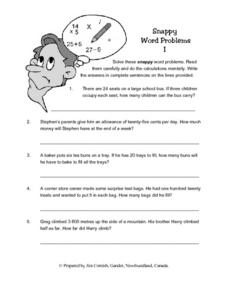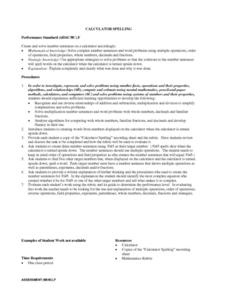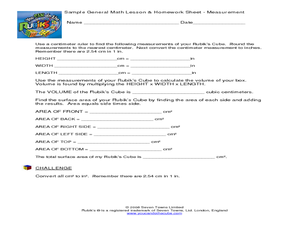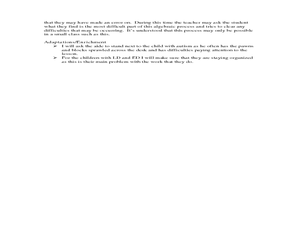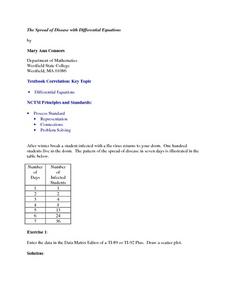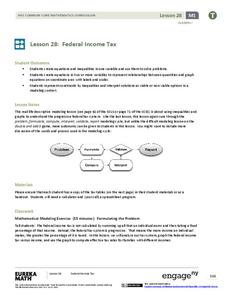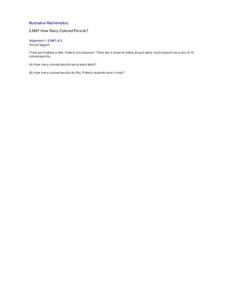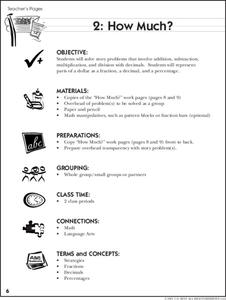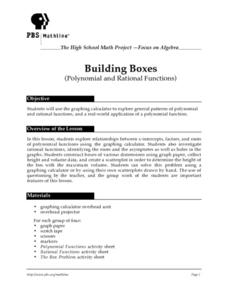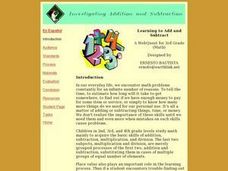Curated OER
Snappy Word Problems
In this math worksheet, learners read 5 word problems with basic calculations. Students are instructed to do mental math and write the answers.
Curated OER
Snappy Word Problems II
In this math worksheet, students read 8 word problems. Students do the calculations mentally and write the answers in complete sentences on the lines.
Curated OER
Squares and Square Roots II
Students evaluate squares and square roots. Through practice, they discover the inverse relationship between squares and square roots. Students take notes, solve square root and square root problems, and classify numbers as rational or...
Curated OER
Squares Have Roots?
Students define a square and connect this information to a square root. In this square root lesson, students make a chart listing square numbers and their roots.
Curated OER
Calculator Spelling
Sixth graders practice creating and solving number sentences on a calculator. They interact with number facts, their properties, algorithms and estimation. Each student recognizes inverse relationships of addition, subtraction,...
Curated OER
Measurement
Learners measure angles, perimeter, area and volume. In this geometry lesson, students define different ways to measure and solve for the perimeter, area and volume of geometric shapes. They analyze and process information to help them...
Curated OER
Hands-On Algebra
Seventh graders study linear equations. For this algebra lesson, 7th graders solve and write two step linear equations in one variable.
Curated OER
Uniform-Motion Problems: Just Playing with Cars
Students explore the concept of the formula for distance. For this formula for distance lesson, students time battery operated cars with constant velocity over 15 meters. Students use the distance = rate x time formula to determine the...
Curated OER
The Spread of Disease with Differential Equations
Twelfth graders solve problems using differential equations. For this Calculus lesson, 12th graders analyze data regarding the spread of a flu virus. Students use the symbolic capacity of the TI-89 to develop a model and analyze the...
Arizona Department of Education
Introduction to Integers
Welcome to the backward world of negative numbers. This introductory lesson teaches young mathematicians that negative numbers are simply the opposite of positive numbers as they use number lines to plot and compare single-digit integers.
Mathematics Assessment Project
Representing Functions of Everyday Situations
Functions help make the world make more sense. Individuals model real-world situations with functions. They match a variety of contexts to different function types to finish a helpful resource.
Mathematics Assessment Project
Representing Quadratic Functions Graphically
Sometimes being different is an advantage. An engaging activity has scholars match cards with quadratic functions in various forms. Along the way, they learn about how each form highlights key features of quadratic functions.
EngageNY
Federal Income Tax
Introduce your class to the federal tax system through an algebraic lens. This resource asks pupils to examine the variable structure of the tax system based on income. Young accountants use equations, expressions, and inequalities to...
Illustrative Mathematics
How Many Colored Pencils?
Support young mathematicians' interpretation of place value in order to multiply single-digit numbers by 10. The task builds upon and enhances a learners' understanding of place value, a second grade skill, while introducing them to...
Mathematics Assessment Project
Evaluating Statements about Probability
Learners first complete an assessment task where they assess statements on probability. They then sort cards containing probability statements as being either true or false.
Alabama Learning Exchange
Mix it Up! Exploring the Commutative and Associative Properties of Addition
Examine commutative and associative properties with your class. They'll explore the relationships between addition and subtraction and investigate patterns as they solve addition problems. Links to an assessment and a table game are...
Curated OER
Similar Triangles
Tenth graders practice solving proportions from similar triangles. They watch a PowerPoint presentation and complete a worksheet each of two days of this lesson. Links for worksheets and PowerPoint presentations are included with this...
Curated OER
How Much?
It's time to go back over all that your class has learned about decimals, fractions, and percentages! To do so, individuals solve story problems that involve addition, subtraction, multiplication, and division with decimals, explain how...
Curated OER
Subtracting With the Hundreds Place And Regrouping
Learners solve math problems involving subtracting with regrouping. They practice the steps for subtracting in the hundreds place with regrouping, through teacher guided practice. Independently, pupils complete story problems involving...
Curated OER
Digger and the Gang
Help online friends Digger and Sprat from the BBC series to solve math problems! In a series of activities, your class will use data sets to calculate measurements, averages, means, and probabilities. The class completes worksheets and...
Curated OER
Building Boxes- Polynimial And Rational Functions
Pupils investigate the concepts of polynomial and rational functions. They identify the general patterns used to solve problems. The use of real world contexts in the problems helps to promote engagement and understanding of how the math...
Curated OER
Storing CD's
Students will solve a word problem as an in depth investigation,. The lesson is based upon standards that are foundational to further development of math skills. The learners use logic and higher order thinking skills to accomplish the...
Curated OER
Learning to Add and Subtract
Young learners practice addition and subtraction to solve problems. They use a webquest application to model how to solve math problems using pictures, words and numbers, and also practice using multiplication and division.
Curated OER
Direct, Inverse, And Joint Variation
Students engage in a lesson that has them practice solving equations using multiplication and division. They practice solving problems using the properties needed and then students practice changing word problems into an equation.


